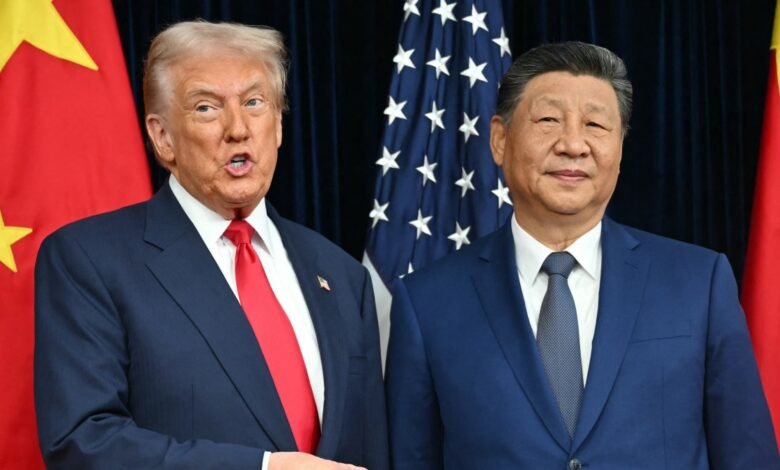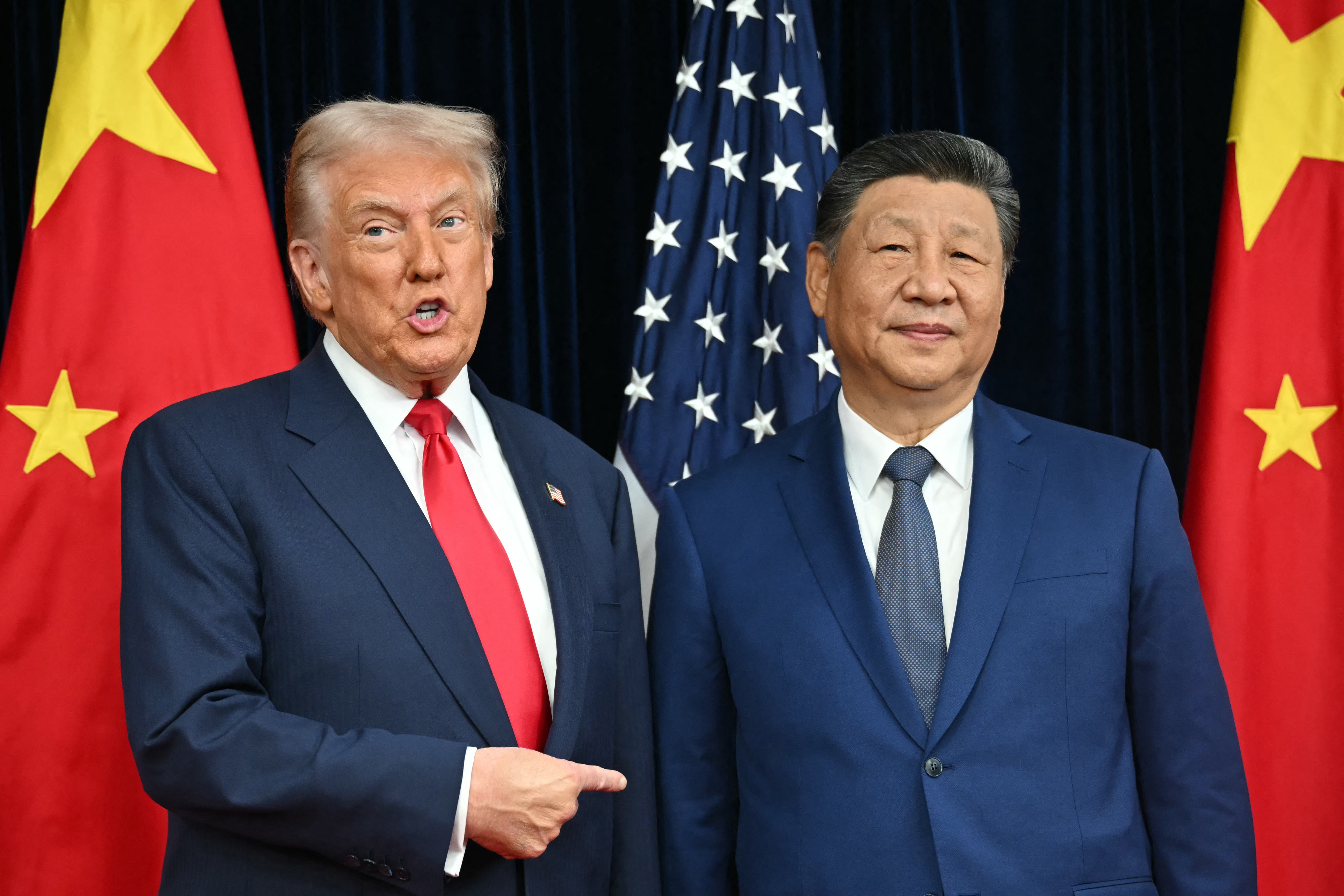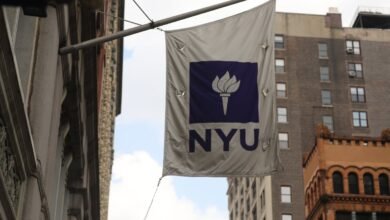

President Donald Trump and Chinese leader Xi Jinping met in South Korea on Thursday, looking to cool an increasingly heated relationship between their two countries at their first meeting since Trump returned to office.
“We’re going to have a very successful meeting, I have no doubt,” Trump told reporters before the start of the sit-down in the port city of Busan.
He called Xi a longtime friend and “tough negotiator,” though he added that he wasn’t sure whether they would sign a deal at the end of it.
“Could be,” Trump said. “I think we’ll have a great understanding.”
For his part, Xi acknowledged “frictions” between the world’s two biggest economies, saying that “given our different national conditions, we do not always see eye to eye.”
The meeting between the two leaders, which took place at an air force base near Gimhae International Airport, lasted about an hour and 40 minutes, with Trump appearing to say something into Xi’s ear as they departed.
There were smiles among members of the U.S. delegation as they followed, and Commerce Secretary Howard Lutnick offered a thumbs up. Trump is now headed back to Washington after completing a three-country Asia tour.
The outcomes of the meeting were not immediately clear. Trump and Xi were expected to discuss moves on tariffs, combating fentanyl and access to rare-earth minerals, while leaving bigger targets for later.
With a Nov. 10 deadline to reach a tariff deal approaching, what began as Trump’s crackdown on the flow of fentanyl into the U.S. has broadened into a longer list of trade and security issues.
The working expectation was that Trump and Xi would agree on a pause in the fight rather than finalizing a sweeping deal, a person familiar with the planning said before their meeting. Beijing could ease export curbs on strategically crucial rare earths, Washington could hold off on broad tariff hikes, and both sides could reach for gestures, such as expanded purchases of U.S. farm goods by China.
Xi is also weighing steps on fentanyl chemicals, likely focused on choking off money-laundering networks tied to gangs, this person said. A rollout of a larger agreement could be staged around Trump’s planned visit to China next year.
The president had said he expected to lower tariffs on China that he imposed over its role in the illicit international flow of fentanyl components. He also said he hoped to finalize a deal on TikTok that would allow the social media app to continue operating in the U.S. despite a law, passed before he took office, that had been poised to ban it.
Both Trump and Xi wanted the optics and tactical aspect of this meeting to go well, the person familiar with the planning said.
Dan Caldwell, a former senior adviser to U.S. Defense Secretary Pete Hegseth, said Trump deserved credit for pursuing a pragmatic China policy that maintained what he said was strategic ambiguity while taking steps to restore important military capabilities to deter Chinese aggression.
“A lot of folks wanted to assume that he was going to be reflexively hawkish on China,” Caldwell said of Trump. “That hasn’t been the case.”
But Caldwell cautioned against expecting a breakthrough in Busan. “I don’t think the overall push hinges on one meeting,” Caldwell said. “Ideally, these go well, but the whole thing does not hinge on just one set of talks.”
In other words, the goal is to make enough progress to get to the next date between the two leaders. Trump said earlier that he and Xi have agreed to meet again in China and in the United States, “in either Washington or at Mar-a-Lago.”
Treasury Secretary Scott Bessent told NBC News this week that Trump is likely to visit Xi in Beijing early next year, before the Lunar New Year in February.
Miles Yu, a former State Department adviser on China, said the U.S. and Beijing are “sizing each other out” with trade now a key battleground issue. Washington is pushing for concrete steps on fentanyl, market access and more, he said, while China “stonewalls and foot-drags” and offers only broad “frameworks.”
“This is the root cause of the five rounds of futile negotiations so far with China without a breakthrough,” Yu said, adding that the administration is trying to shift China’s approach by rallying its neighbors, a strategy that he said “may or may not work.”
After talks with Chinese counterparts in Malaysia last weekend, Bessent said negotiators had shaped a framework for the two leaders to consider that spanned tariffs, trade, fentanyl, rare earths and “substantial” purchases of U.S. agricultural products such as soybeans.
He credited Trump’s threat of an additional 100% tariff with creating leverage and said he believes that the framework would avoid that outcome and open space for tackling other issues.
Xi said Thursday that the framework agreed in Malaysia had “provided the necessary conditions for our meeting today.”
The meeting was the climax of Trump’s five-day trip to Malaysia, Japan and South Korea. During the trip he signed agreements with all three countries as well as Thailand and Cambodia; made new foreign investment announcements; and proclaimed that tariff leverage can drive warring parties to stand down.
Reflecting on his approach, Trump said going against the grain can sometimes deliver results.
“Oftentimes you’ll go the opposite way of almost everybody, and you’ll be the one that’s right, and the others will be the one that’s wrong,” he said in Gyeongju, South Korea, offering a peek into his thinking. “That’s where you have your greatest successes.”
Still, Trump is continuing a long-standing practice of meeting with allies before Beijing, which former Assistant Secretary of State Dave Stilwell said indicates that the U.S. is not going to trade its alliance commitments for a deal with China.
Some of the most sensitive terrain in the discussions involves critical minerals, said Stilwell, who also underscored the political guardrails around concerns for the Beijing-claimed island of Taiwan.
“Acknowledge the words, but look at the actions,” he said, citing Secretary of State Marco Rubio’s recent comments that the U.S. isn’t trading away Taiwan’s sovereignty for better deal terms with Beijing.
Some of Trump’s aides had worried that the president could shift the U.S. position on independence for Taiwan, walking away from long-standing U.S. policy, and had advised him against it, NBC News reported this week.
Trump seemed to downplay any discussions, saying before his meeting with Xi, “I don’t know that we’ll even speak about Taiwan.”
Analysts in the region, too, saw limited room for a sweeping agreement this week. It’s unlikely that Trump and Xi will reach a comprehensive deal that settles the long-term structural differences between the U.S. and China, said Zeng Jinghan, a professor of international relations at the City University of Hong Kong. “But
“Some sort of consensus and agreements are very possible,” said Zeng Jinghan, a professor of international relations at the City University of Hong Kong, given that both sides want “a little bit of de-escalation.”
But Trump and Xi were unlikely to reach a comprehensive deal that settles the long-term structural differences between their countries, he said.
The hope instead is for “less aggressive” rhetoric, Zeng said, with both Beijing and Washington likely to come back and declare the meeting a success.
Carol E. Lee, Peter Guo and Peter Alexander contributed.




